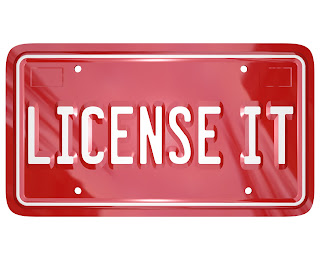The issue of what we should charge as voice actors continues to be the most discussed topic in our industry. From talent lamenting major national buyouts coming through agents for $5,000 and then reappearing elsewhere at even more egregious rates to the festering discomfort caused by mega-discount portals where anyone with a USB mic can sell their voice for five bucks to the Wild West of online casting, where excellent rates mingle with exploitative ones. It seems that each day brings a barrage of questions from talent, both new and experienced alike, about what they should charge. However, what is often lost in the conversation is how they should charge. License it. Let me explaine
Unlike craftsmen who create an object of great beauty or utility, or a professional who is paid to complete a defined task that serves a particular temporal purpose, voice actors ply their trade in a field where the majority of what we do creates lingering value for the buyer. When a voice actor is hired, their work is used to generate revenue over and over again; It is not a one-and-done proposition.
Unions understood this well when crafting the concept of cyclical and residual pay for signatories, most often applied in relation to voiceovers that are broadcast on traditional media. This is a structure non-union talent would be well advised to emulate.
That said, in an industry changing more rapidly than ever before, it is difficult to pin down what work has what value and for how long. What about Corporate/Industrial narration? E-Learning? Perhaps most critically, Web Ads and Pre-Roll. How do they fit in?
As talent, we are often thrilled to book a job and get paid. It’s a rush, talking into a microphone and making more in an hour than most people make in a day, or a week. We are blessed, to be sure, but that doesn’t mean we should compromise our value, especially when our work is being used to generate profits far beyond the compensation offered. Furthermore, it’s easy to spin things negatively from a supply and demand perspective for talent, but a quick listen to the quality of the vast majority of auditions submitted online will demonstrate that we are in a much stronger position than we think.
We are not selling clay pots, sculptures, or accounting services. We are not even selling voiceovers. Huh? What are we selling if we aren’t selling voiceovers? Very simply, we are selling licenses.
Like musicians or software bundles, we should not consider our product static or temporal. We are selling the right to obtain value from our talent for a limited time that is also limited in scope. This can apply to anything that isn’t strictly internal-facing.
Don’t be afraid to ask questions of your clients:
* How long will you be using this?
* Where will it be used…on what platforms/media?
* How many views/impressions do you anticipate it will receive?
The fear of losing work because you assert your rights too aggressively is not unwarranted, but it is overcome by the long-term gain in securing clients who are willing to treat you fairly. Moreover, if a client has reached out to you about a job, they are likely already committed to or nearly committed to your voice. You are holding more cards than you realize.
Try negotiating a one-year buy for Corporate/Industrial, E-Learning, Explainer, Telephony, and Medical. For Web Ads and Pre-Roll, use union cycle templates if you can, such as the thirteen-week standard, and go for a year as a compromise.
Remember, perpetuity means forever, and forever is worth a lot.



Always sage advice from a genuine warrior of the VO community.
It is nice to have this topic talked about so plainly without running it around in circles that just confuse the listener. Thank you.
That's one of the things I like best about the VO crowd, there is a lot of pay-it-forward and you my friend are one of the biggest pay-it-forwarders!
It's always a quandary, but if we bring quality to the table for our customer we should be paid accordingly.
Yes we are blessed, and to those that much has been given much is required.
Nuff said…
An "Ah ha" moment! Thank you for the clarity, J.Michael.